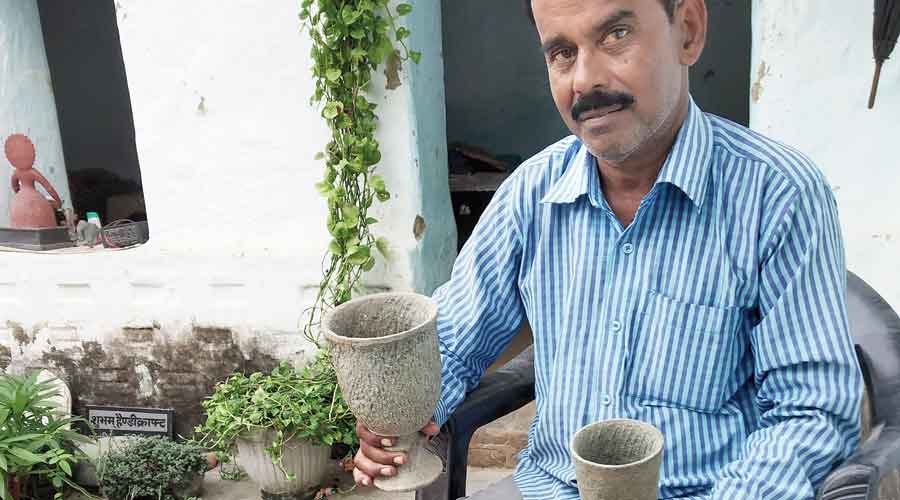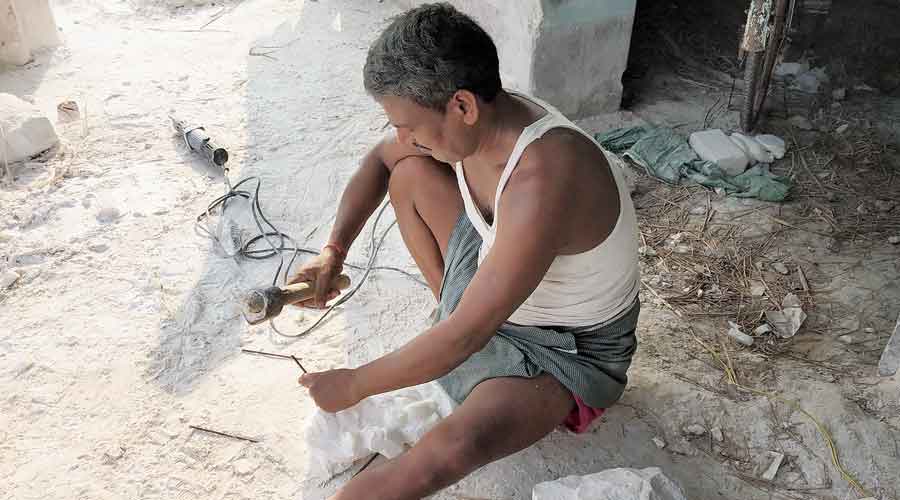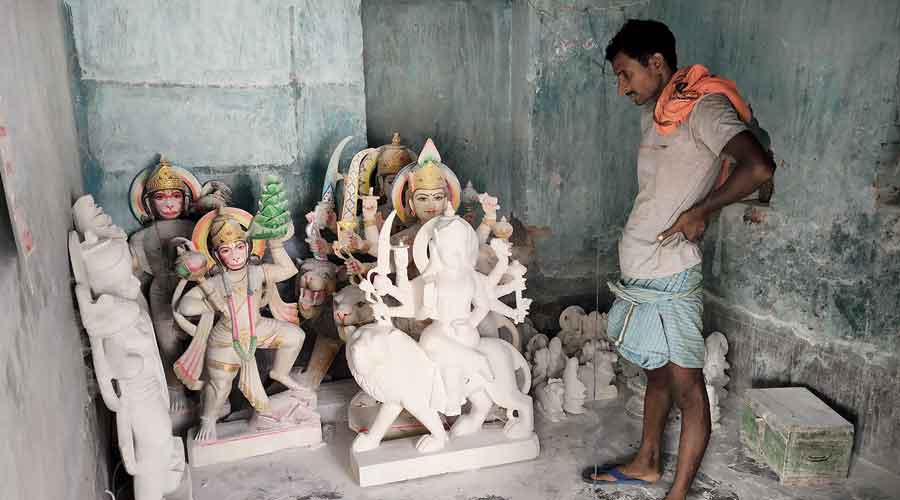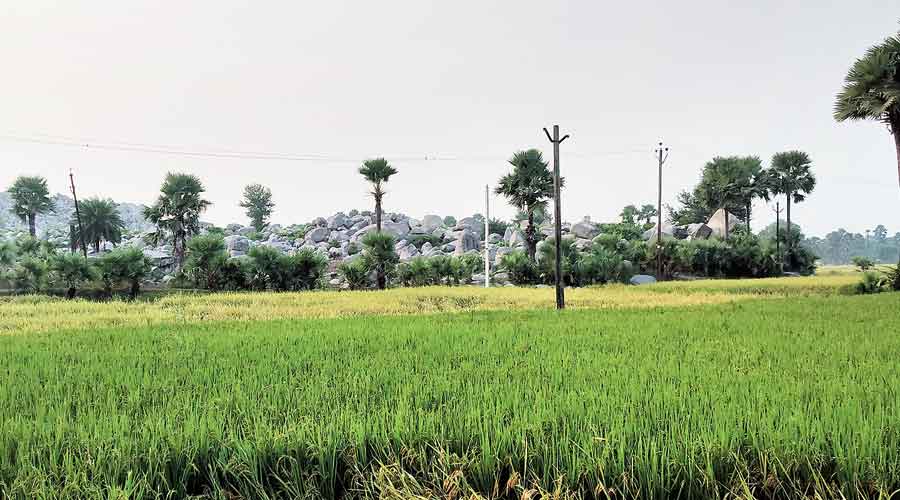Sounds of hammer and chisel indicate the Patharkatti village of stone sculptors, surrounded by hills and paddy fields in Bihar’s Gaya district, is close by.
Once upon a time traders from all over the country would wait here with their vehicles to buy and take away the stone statuettes and idols, especially of Lord Buddha and Hindu gods and goddesses, grinding bowls, pestles, glasses, bowls, plates and coasters crafted by the sculptors.
Though its election time in the state, none of its buzz could be seen or felt here. Some people are working on stones, giving them the desired shapes. Others are just squatting here and there or loitering around.
“There is virtually no work and no sale since the lockdown. Marble from Rajasthan is not coming. Orders for various objects are just a trickle of what we used to get before. Some of us, you can say around 20 per cent of the craftsmen, are enough to fulfil the orders. We are just surviving somehow,” said sculptor Pramod Kumar.

Sculptor Rabindra Nath Gour shows 200-year-old unfinished stone utensils Telegraph picture
The sculptors blame the government and officials for ignoring them during the lockdown and the ensuing months. The politicians also did not come to the village to take stock of the situation.
“We know that polls are here, but no big politician of any party has come here. Kaun munh lekar aayega yahan? (With what face will they come here?). They must be ashamed of approaching us after neglecting us completely after the coronavirus outbreak. None of them were bothered whether we survived or not. Our livelihood stands almost wiped out,” said another sculptor Bijendra Prasad.
Patharkatti is around 100km south of state capital Patna.
Stone sculpting tradition in the area dates back to Mauryan, Gupta and Pala dynasty periods. But Patharkatti came to prominence when Maratha ruler Ahilyabai Holkar (1725–1795) of Indore decided to reconstruct the famous Vishnupad Temple at Gaya. She is said to have brought around 900 Gour Brahmin artisans from Rajasthan for the purpose.
The artisans camped at Patharkatti, around 35km from Gaya, in the vicinity of the hills of black granite rocks that were found suitable for the temple.
The stones were carved according to the temple’s design, taken to Gaya and assembled to form its structure in 1787 without the use of any mortar.
A large number of the artisans decided to settle down at Patharkatti. In the coming years they trained people from the village and the surrounding areas in stone craft. Neighbouring villages like Khukhari, Deay and others also now excel in the craft.
Patharkatti comes under Atri Assembly constituency. Altogether 11 candidates are in the poll fray, but the main contest is expected to be between Manorama Devi of the ruling Janata Dal United (JDU) and Ajay Yadav of the Rashtriya Janata Dal (RJD).
Though the battle may swing one way or the other, the villagers do not seem very happy with governance.

A sculptor carves an idol Telegraph picture
“Many of us found it extremely difficult to make both ends meet during the lockdown. But no help came from the government. We did not get foodgrains also. We will vote for the candidate who works for our welfare; who encourages and promotes our art,” another sculptor Satyendra Choudhari said.
Meanwhile, one of the settlers from Rajasthan — Rabindra Nath Gour, a well-known stone sculptor who has trained several villagers in the craft — threw light on the economy and the crisis being faced by the village and its inhabitants and the role of politics in it.
“Marketing is a huge problem for us. Traders from other states used to come here and take truckloads of statues and other stone objects from here till three decades ago. They would give us money in advance, place the order and take away finished products. However, things deteriorated after 1990 when Lalu Prasad came to power. The buyers were harassed, looted, kidnapped and even killed in that period. So they stopped coming here,” Rabindra said.
“We then started taking our stonework to sell in states like Rajasthan, Gujarat, Madhya Pradesh and others but the traders there stopped making full payments. This was a reversal of the previous trend. Law and order improved and peace prevailed after Nitish Kumar became the chief minister in 2005, but the traders did not return,” he added.
Many of the families that had come from Rajasthan went back during this period. The sculptors say that there is a high demand for black stone Buddha idols among the foreign tourists because of benevolent emotions on their faces. These idols have become a brand and are known as Magadh Buddha.

Some idols kept in a godown at Patharkatti Telegraph picture
The artisans have demanded that the state government provide raw materials, purchase the finished objects and also open its outlets at various tourist spots to perk up the sales. But nothing much has happened on the front.
The state government did arrange for advanced training of some of the sculptors in Odisha and Tamil Nadu, but the skills are yet to be used due to the lack of raw materials and marketing.
The sculptors and their families at Patharkatti have now started wondering whether it would be viable for their children to carry on the tradition in the coming years. They cite government apathy for their pessimism.
However, all is not lost. Some young men want to take the stone-sculpting art of the village to a wider horizon.
“We want to give it an international exposure. We cannot rely only on the government for this, but it could certainly help us in the initial stages,” said Shubham Gour, Rabindra’s son and an MBA aspirant.
Atri constituency, including Patharkatti, voted on Wednesday.










